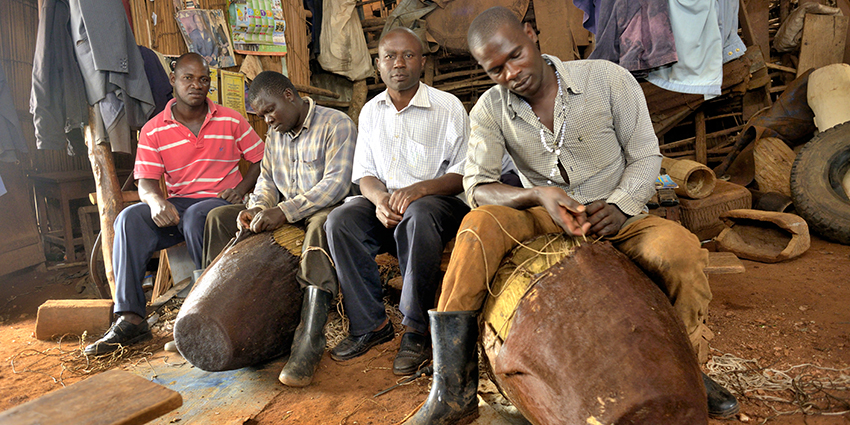
Supported by the Grameen Crédit Agricole Foundation since 2015, UGAFODE Microfinance Limited is a microfinance institution that offers inclusive financial and non-financial services to low income, but economically active populations in Uganda. UGAFODE is one of the three organisations supported by a programme launched by the Foundation, The Swedish International Development Cooperation Agency (Sida) and the UN Refugee Agency to support the financial inclusion of refugees. Thanks to the financial and technical support, UGAFODE opened a branch in Nakivale Refugee Settlement in Uganda. Spotlight on an interview to Shafi Nambobi, CEO of UGAFODE.
1. In a few words, what is UGAFODE Microfinance Limited?
UGAFODE Microfinance Limited began in 1994 as an NGO focused on group credit for women and has since transformed into a Microfinance deposit-taking institution regulated by Bank of Uganda. The institution specifically targets low income but economically active population in the country through 7 urban and 12 rural branches, serving over 110,000 savings customers and 8,000 loan clients. We offer a variety of financial services, which include savings, loans and money transfer services with a loan portfolio of €12.1 million and savings volume of €6 million.
2. UGAFODE received an innovative support from the Grameen Crédit Agricole Foundation, the Swedish International Development Cooperation Agency (Sida) and the UN Refugee Agency in 2019, when it was selected as beneficiary of a programme to support financial inclusion for refugees. Can you explain the initiative and the support UGAFODE received?
Most of the refugees have been discriminated against and denied credit facilities from financial institutions as they are viewed to be too risky, despite being engaged in agriculture plus retail trade and commerce. In March 2020, UGAFODE was the first financial services institution to set up a physical branch in a refugee settlement in Uganda thanks to the programme. Nakivale refugee settlement is the 8th largest in the world hosting over 134,000 refugees from 13 countries. The total project budget is €536,780 with €396,882 coming from Sida and €139,810 contributed by UGAFODE in three years. Furthermore, the Foundation also granted a new loan of €540,000 in July 2020, of which 50% will be used in the framework of the refugees programme, to lend to refugees and host populations.
3. What are the first outcomes of the project?
Clearly, the project has passed the proof-of-concept stage. Since the opening of the Nakivale’s branch, 505 loans totalling to €383,596 have been disbursed between 2nd March 2020 and 31st December 2020, mainly to support small and medium enterprises and agriculture individual loans. It is important to note that all this has been achieved under Covid-19 crisis. The Portfolio At Risk (PAR) is at 1.65% for 1 day and 0% for 30 days, which is remarkable and appreciated. Moreover, we have reach over 5,000 refugees with financial literacy messages and 2,534 clients have opened savings with a total of €65,112. A total of 5,301 refugees have received €776,345 through money transfer services from friends and relatives at the Nakivale branch in the nine months since the branch was opened. We currently employ 21 staff with 8 refugees at Nakivale plus 4 in the Call Centre in Kampala to manage customer complaints in the major refugee languages.
4. How did Covid-19 pandemic affect the project? What measures have been taken to face the crisis?
The project implementation and opening of the branch happened at the beginning of the Covid-19 crisis. Fortunately, as government rendered financial services as essential, the Nakivale branch was able to offer needed services to the settlement clients on a very positive note. UGAFODE has been able to adjust its policies and procedures to serve refugees within the regulation guidelines. We recruited refugee staff at the Call Centre to provide guidance and information to the clients. We also built a branch extension to provide sufficient space to ensure safety of both staff and customers. Furthermore, we granted rescheduling options to the clients with loans to support them in this period of crisis. The Grameen Crédit Agricole Foundation and KIVA supported us to face the crisis. The Foundation granted us flexible budget lines within core lines to cater for crisis’ uncertainties. The Branch operates under strict COVID 19 SOPs (Standard Operating Procedures) instituted by the Ministry of Health and Government. We will also be able to buy 3 more motorcycles to enable the branch staff reach out to more clients, easily and faster.
5. What are now the priorities of the project?
There are three priorities :
- Scale up financial literacy trainings to raise awareness of at least 8,800 refugees and 8,000 host communities in year 2 and 15,500 refugees and 14,000 host communities in the last year of the project.
- Conduct a customer survey to facilitate informed decisions and develop products tailored to refugees.
- Roll out the project model to other settlements. After Nakivale, the project is going to be replicated to other refugee settlements at the earliest. Initial feasibility studies have been conducted for Kyaka, Kyangwali and Rwamwanja refugee settlements.